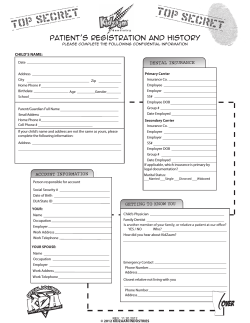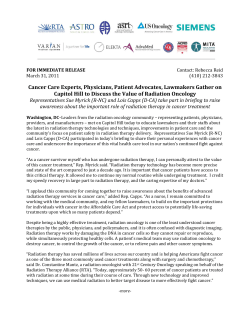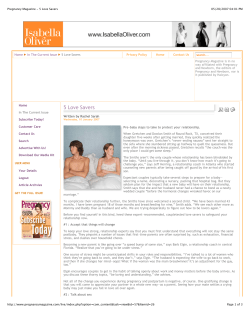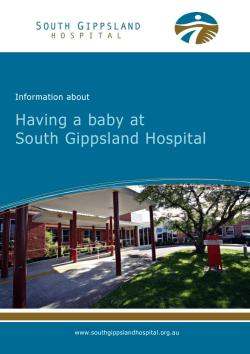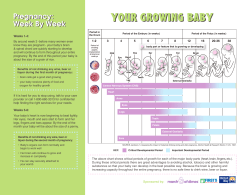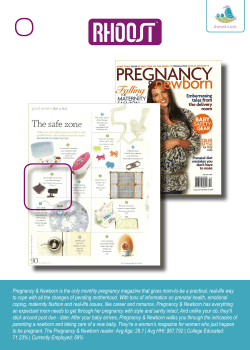
Guidelines for expectant or breastfeeding mothers
Working safely with ionising radiation: Guidelines for expectant or breastfeeding mothers HSE Health & Safety Executive � Introduction What should my employer be doing? This leaflet provides advice for female employees who may be exposed to ionising radiation during their work. It is specifically aimed at those women who are thinking of having a baby or are already pregnant or breastfeeding. Before you start work with ionising radiation your employer should have carried out a risk assessment. This should enable them to decide what they need to do to restrict your exposure to ionising radiation. The assessment will indicate what radiation doses you would be likely to receive and what needs to be done to protect your baby if you are pregnant or are breastfeeding. Although occupational exposures during pregnancy are not a significant problem for female employees in Britain, the leaflet explains what you can do to safeguard your family and yourself. Usually very little extra will need to be done, as the radiation protection measures for all staff already in place are likely to be sufficient to protect you and your baby. If you are pregnant or breastfeeding, it does not necessarily mean you have to avoid all work with radiation or radioactive materials. The advice covers your employer’s normal duties under the Ionising Radiations Regulations 1999 and the additional requirements during pregnancy and breastfeeding. It also explains why it is important for you to let your employer know as soon as you are aware that you are pregnant. Work areas where extra care needs to be taken to reduce your exposure to ionising radiations are ‘controlled’ areas. Some areas may be ‘supervised’ areas if the employer needs to keep these under review. All local rules applicable to these areas will give details of the key working instructions that must be followed in that area. 2 What about ionising radiation sources that are not work-related? We are all exposed to natural background radiation from sources outside of work, such as: The local rules may refer to or include any specific procedures to be followed by pregnant or breastfeeding employees. If you work in a controlled area (or a supervised area where local rules apply), you must follow the local rules to ensure you and your baby are protected. ■ ■ ■ ■ If your place of work has controlled or supervised areas, but you do not enter them, then there is no risk of radiation exposure to your baby from those areas. Examples include working in an office next to the X-ray department in a hospital, or working in the administration building at a nuclear power plant. the earth itself; cosmic radiation from outer space; radon gas coming through the ground; and traces of natural radioactivity in our food. Generally, these cannot be easily controlled but they do not result in significant exposure to a baby in the womb. The background dose to you from all natural sources of radiation in our environment is about 2.2 mSv per year (mSv is an abbreviation for millisievert which is a measure of your radiation dose). The average ranges from 1 mSv to 8 mSv per year, depending on where you live in Britain. This wide variation is mainly due to exposure from radon. Because radon is a gas, this means that although you are exposed, the exposure to a baby in the womb is very small. Other sources of natural background radiation are generally not controllable and during pregnancy the baby would receive a dose of about 1 mSv from these. 3 What are the legal dose limits and other requirements? There are legal dose limits (20 mSv per year for employees over 18 and stricter limits for people under 18) but your employer must be restricting your exposure, where reasonably practicable, to well below these limits. That is the primary aim of radiation protection legislation. For individuals, the average annual dose from medical X-ray examinations is about 0.4 mSv per year. Many types of X-ray examinations would not give rise to any significant dose to your baby, but some could. You should inform your doctor when you are pregnant, so that he or she can advise you. Employees who work with ionising radiations are designated as classified persons if they are likely to receive a dose exceeding 6 mSv per year. The employer will have made arrangements for these people to have individual dose records. Most workers receive much less than this, and if you are not a classified person your dose is likely to be lower still. Don’t worry if you are planning to start a family, because your employer should already have an effective system in place for restricting your exposure which is perfectly adequate to protect your baby in the early stages before you confirm that you are pregnant. This should be in place whether you are classified or not. 4 How do I find out about my radiation dose? Informing your employer Employers keep records for all classified persons. You have a legal right of access to this data. If you are not a classified worker, individual records may be available. Your employer, line manager or safety representative should be able to provide and interpret this information. It is in your own and your baby’s interests that you inform your employer as soon as you know you are pregnant. Your employer needs to know if you are pregnant before they can make any changes that may be required to the protection measures. However, you are not legally required to do so and can choose to keep that information private. Even if you do not actually work with radiation and are not monitored personally, you can still ask to see the risk assessment for any area in which you work and discuss the results with your safety representative or line manager. When you decide to inform your employer, this should be in writing. The person to inform may be named in the local rules. This may be your head of department, your supervisor (eg the superintendent radiographer), your line manager or the occupational health department. You may also be asked to provide a medical certificate. From this point on, your working conditions will have to be controlled so that the dose to your baby from your work is minimised and unlikely to be more than 1 mSv for the remainder of your pregnancy. This dose level has been set very prudently and excludes any natural or non-work related radiation your baby might receive. 5 Is radiation at work going to affect my baby? What should be done to keep my baby's dose as low as possible? There should be no significant risk of harm to your baby from radiation at work and certainly there should never be a need to terminate a pregnancy because of radiation doses normally received at work. Naturally you will want to take precautions to ensure that your baby is not exposed unnecessarily. Doses to your baby may come from external exposure, for example from X-rays, or from internal contamination due to working with radioactive dusts, liquids or gases. Different action may therefore be necessary, depending on where you work and the job you have to do. Your baby will receive about 1 mSv from sources of natural radiation during pregnancy. The added exposure at work should be no more than this, and in practice is likely to be considerably less. The added risk of childhood cancer from 1 mSv to your baby would, at worst, be a small percentage of that from other causes. Your employer will need to consider the risk assessment. Depending on whether your baby would be likely to receive more than 1 mSv during the remainder of your pregnancy, they may need to change your working conditions to make sure this doesn’t happen. You should follow the advice you are given. Examples of precautions that can be taken If you work with diagnostic X-rays, you should keep as far away as practicable from the patient and the X-ray tube while it is on, preferably behind the protective screen. If you have to be outside the protective screen during exposures, you must wear a lead apron which is comfortable to wear, fastened properly at the sides and covers your abdomen comfortably. Your employer will 6 per hour as a constant reminder when a hazard is present. (Microsieverts relate to the hourly dose, millisieverts to the annual one.) need to check that such protective measures do not create other risks such as back problems. Although it is not a legal requirement, it may be possible to wear an active dose monitor for additional reassurance. If you have to be inside the X-ray room itself and can move further away from the exposure, this could halve your radiation dose. If you work as a member of an aircrew or travel extensively by air, your work may need to be rescheduled to reduce any additional exposure from cosmic radiation to your baby. If you work in a radiotherapy ward with implant patients, you must use the bed shields provided to protect you, and not stay with the patient longer than is necessary. You may need to stop doing certain duties or caring for certain types of implant patients. If you work in any areas with high dose rates such as those with cyclotrons, research accelerators, gamma radiography and some areas in nuclear power plants, your employer may need to temporarily assign you to tasks in areas with lower dose rates. If you work with unsealed radionuclides, you may have to stop doing some jobs, such as giving certain diagnostic and therapy radionuclides, supporting patients during imaging, some radiopharmacy tasks and dealing with spills of radioactive materials. If you work on seagoing vessels or in dockyards where there is potential for significant exposure, you may need to be allocated alternative work. If you work as an industrial radiographer, particularly using mobile equipment, you could carry an electronic dosemeter with an alarm which sounds at 1 microsievert 7 What should be done if I am breastfeeding my baby? External radiation sources, such as X-rays, cannot contaminate your body. You only need to consider doing anything if radioactive materials could be taken into your body, for example by swallowing them or breathing them in. Some radioactive materials, if swallowed, get into breast milk and would contribute to your baby’s radiation dose. If you work with these materials, your employer must take the necessary steps to prevent this happening. It would be wise to discuss with your employer any such measures that may need to be taken to protect your baby while you are breastfeeding. You have the right to breastfeed for as long as you wish, but it would be sensible to notify your employer if you continue after six months to make sure that any special measures are continued and to tell them when you stop breastfeeding. Your employer’s duty to perform a risk assessment should cover what action may be necessary and you can ask to see this if you want to know what substances have been considered. When you return to work after having your baby and you work in an area where there is a significant risk of bodily contamination, your employer will normally assume that you are breastfeeding for six months unless you indicate otherwise. It is always a good idea to put this in writing and your employer has no legal obligation to consider any appropriate protection measures to restrict the exposure of your baby from contamination unless you do so. 8 Other advice you may wish to follow Summary of general advice ■ ■ ■ ■ ■ Read, understand and follow the local rules for the areas in which you work, and any instructions and procedures designed to restrict exposure in these areas. This should restrict your exposure and that of your baby. Tell your employer in writing as soon as you know you are pregnant. Follow the advice of your employer regarding any additional restrictions. If you work with unsealed radioactive materials or in designated contamination areas, tell your employer (in writing) if you are breastfeeding your baby, especially if you continue for more than six months. Attend any specific and relevant radiation protection training sessions provided by your employer to keep you informed. ■ ■ ■ 9 Discuss with your employer your current dose to date and any changes that may necessary in your future work, ie: - if your exposures are normally between 1 mSv and 6 mSv per year, you should discuss with your employer what action should be taken to restrict your baby's dose to 1 mSv for the remainder of your pregnancy; or - if your exposures are likely to be over 6 mSv per year, you may need to change your type of work. Discuss the work situation with your line manager, safety representative, radiation protection supervisor (RPS), or trade union representative. Seek further information - don’t assume that your GP or midwife will be able to answer any questions about radiation and your baby, they are not radiation experts (see ‘Further reading’). Your employer’s responsibilities ■ Your employer should: ■ ■ ■ ■ ■ ■ keep your exposure as low as is reasonably practicable; undertake a risk assessment, identifying additional actions if necessary, for example: - altering your hours of work with radiation; - providing additional protection for your baby where practicable; - identifying and offering you alternative work without loss of pay or, where this is not practicable, temporarily suspending you from work on full pay; ensure your doses are kept within the dose limits; ensure you are given training, information and instruction to cover the fundamental and routine requirements in order to work with ionising radiation (eg the risks, effects and sources of radiation, dose limits, need for designation of classified persons, maintaining dose and health records, monitoring of areas and provision of local rules); consult and inform safety representatives about the general arrangements for employees who are pregnant or breastfeeding; ■ ■ consider including guidance concerning pregnancy in the local rules; inform you of any local policies regarding pregnant worker activities in general; ensure that information is provided to all female staff working in radiation areas on the importance of declaring their pregnancy as soon as they know; and co-operate with other employers of female staff who may work in radiation areas. Any decision to change your role for the remainder of your pregnancy, or while you are breastfeeding, must not result in reduction of your status or your salary. It is illegal for your employer to discriminate against you just because you are pregnant or breastfeeding. 10 Further reading New and expectant mothers at work: A guide for employers HSG122 HSE Books 1994 ISBN 0 7176 0826 3 Radiation in everyday life (Fact sheet) International Atomic Energy Agency: www.iaea.org/worldatom While every effort has been made to ensure the accuracy of the references listed in this publication, their future availability cannot be guaranteed. Management of health and safety at work. Management of Health and Safety at Work Regulations 1999. Approved Code of Practice L21 (Second edition) HSE Books 2000 ISBN 0 7176 2488 9 Work with ionising radiation. Ionising Radiations Regulations 1999. Approved Code of Practice and guidance L121 HSE Books 2000 ISBN 0 7176 1746 7 Living with radiation National Radiological Protection Board Oxon 1998 (Fifth edition) ISBN 0 85951 419 6 Mum to be? In work? EC088 TUC leaflet: www.tuc.org.uk Pregnancy and work in diagnostic imaging RCR/BIR Joint Working Party Report London British Institute of Radiology 1992 Peter Saunders Radiation and you Commission of the European Communities 1991 ISBN 92 825 9486 6 11 HSE priced and free publications are available by mail order from HSE Books, PO Box 1999, Sudbury, Suffolk CO10 2WA. Tel: 01787 881165 Fax: 01787 313995. Website: www.hsebooks.co.uk HSE priced publications are also available from good booksellers. For other enquiries ring HSE's InfoLine Tel: 08701 545500, or write to HSE's Information Centre, Broad Lane, Sheffield S3 7HQ. Website: www.hse.gov.uk This leaflet contains notes on good practice which are not compulsory but which you may find helpful in considering what you need to do. This publication may be freely reproduced, except for advertising, endorsement or commercial purposes. The information is current at 03/01. Please acknowledge the source as HSE. INDG334 03/01 C400 Printed and published by the Health and Safety Executive
© Copyright 2025


